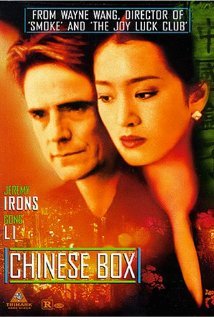“A Changing Hong Kong”

| None | Light | Moderate | Heavy | |
|---|---|---|---|---|
| Language | ||||
| Violence | ||||
| Sex | ||||
| Nudity |
What You Need To Know:
CHINESE BOX begins in 1996 in Hong Kong as English and Chinese are celebrating the New Year while fearing the Communist takeover. Among the celebrants is English journalist John, played by Jeremy Irons, who dances with a Chinese woman named Vivian. John finds he has leukemia and only a few months to live. He decides not to burden Vivian with the news and continues his journalistic pursuits. John interviews a strange young Chinese woman named Jean, who says she lost her own English lover. John discovers that Vivian was a former prostitute who has an affair with her former pimp. When Vivian discovers John’s illness, she offers herself to him before his demise, while Jean realizes she will never be reunited with her former love.
Filmmaker Wayne Wang exhibits a tenderness and a sadness towards his home, Hong Kong. He shows prostitutes on the street, public execution of animals for food and poverty. Wang shows that prostitution remains a problem, as well as materialism. CHINESE BOX isn’t uplifting or even moral, but it is accurate. The only satisfaction is the temporary joy found in fleeting romantic love. Though well-written and well-performed, CHINESE BOX concludes that without hope, a people will perish.
Content:
(Ro, Pa, AC, I, LLL, VV, SS, NN, A, D, M) Romantic worldview with nihilist, anti-Communist & internationalist elements; 24 obscenities & 2 profanities; moderate violence including threats with gun, suicide by gunshot, shoving, fighting, kicking, & some bloody scenes involving processing chickens & fish; implied fornication, implied incest, implied prostitution, scenes of foreplay, heavy kissing, & scenes directly following fornication; upper female nudity & upper male nudity; alcohol use; smoking; and, miscellaneous immorality including images of poverty, lying & cheating.
More Detail:
In the late 1980s, German director Wim Wenders created a touching film about human relationships amidst a changing Berlin at the time of the fall of the Berlin Wall called WINGS OF DESIRE (see review of the American remake entitled CITY OF ANGELS also in this issue). Filled with visual metaphor and touching performances, it remained a unique film about breaking free from totalitarian chains into liberty. Now an antithetical film has been created, entitled CHINESE BOX, about Hong Kong losing the liberty it had under colonial British rule to the chains of Communism and the metaphorical consequences as seen in the lives of a few of its inhabitants. Beautifully photographed and told with great sadness, it is a story of passion and lost love.
CHINESE BOX begins on December 31, 1996 when English and Chinese are celebrating the New Year with trepidation because of the ensuing Communist takeover. Among the celebrants is English journalist John (Jeremy Irons), who dances with a Chinese woman named Vivian (Gong Li). John is painfully aware of their differences and thinks he can never win her love.
A young Chinese protester shoots himself to signify his unwillingness to live under Communist rule, putting a very real negative reminder of this sad part of history. John chats with fellow journalists who contemplate their own future in Hong Kong, but then he passes out. John visits a doctor and finds out he has leukemia and only a few months to live. He decides not to burden Vivian with the news, but he does decide to continue his journalistic pursuits despite quitting his legitimate job.
John encounters a strange young Chinese woman named Jean (Maggie Cheung). He is intrigued by her and offers to pay her money if she will tell her story on video tape. Reluctant at first, Jean agrees and tells John of her lost English lover from high school who was separated from her because of cultural disagreements by their parents.
Meanwhile, John discovers that Vivian was a former prostitute who has a passionless affair with her former pimp. Angered, John goes to a bar where Vivian now works as a bar maid and tells everyone that she is a hooker. Finally, Vivian discovers John’s illness and offers herself to him before his inevitable demise, while Jean realizes she will never be reunited with her former English love.
Throughout the movie, filmmaker Wayne Wang (THE JOY LUCK CLUB) exhibits both a tenderness and a sadness towards his home, HONG KONG. He doesn’t mince images showing the madness of it all, including prostitutes on the street, public execution of animals for food, poverty, and struggles within an area of great population. While speculation covers the nature of Hong Kong’s future, no conclusion is drawn other than that it will change. Wang covers interracial relationships between the English and Chinese, and that prostitution remains a problem, as well as materialism. Hence, CHINESE BOX isn’t uplifting or even moral, but it is accurate, though perhaps nihilistic. John resigns himself to death despite offers of treatment. Likewise, Jean seems destined to forever be unfulfilled. Furthermore, Vivian desires to leave Hong Kong, but does not. Their only satisfaction is temporary joys found in fleeting romantic love.
The direction is skilled with as many images seen through the lens of John’s video camera as through the film camera. Though colorful with brilliant cinematography photographed during the actual time of the takeover, the subject matter is often grim. This is not a film summer thrill seekers, but those who enjoyed WINGS OF DESIRE and WELCOME TO SARAJEVO may enjoy the intimacy of Hong Kong found within. Though well-written and well-performed, CHINESE BOX accurately tells that without vision or hope, a people will perish.


 - Content:
- Content: 

